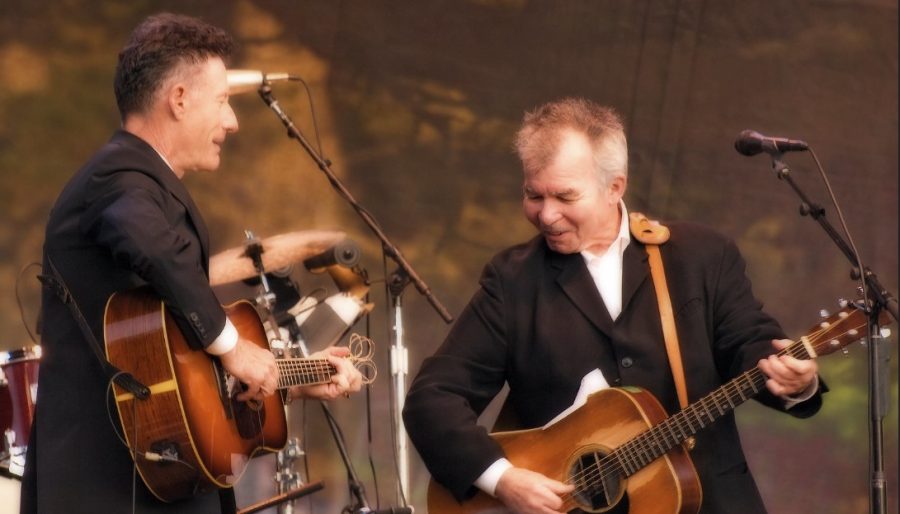Opinion | John Prine bequeaths noble legacy
Photo Courtesy of Eric Frommer
John Prine and Lyle Lovett perform live on Oct. 2, 2009.
Apr 17, 2020
John Prine, like many country artists, put his heart on a mantle for everyone to witness. His music was plain but direct, and his words cut deep. I often forget that the country genre provides us with more than just the soundtracks for silly spaghetti westerns and that it can erect more than images of tumbleweeds, dusty boots and old saloons. Prine wasn’t interested in clichés — he was interested in the truth.
Before he crossed musical boundaries with “Modern Sounds in Country and Western Music,” Ray Charles voiced an admiration for work like Prine’s. If you don’t know who Ray Charles was, know that his approval carried quite some weight.
“(T)he words to country songs … they’re not as dressed up, and the people are very honest and say, ‘Look, I miss you, darlin’, so I went out and I got drunk in this bar,’” Charles once said. “(C)ountry songs and the blues is like it is.”
They certainly were. On Prine’s self-titled debut album — released when he was just 24 years old — the singer-songwriter mused on drug habits, ecological degradation and the poignant march of time. Clearly, he did not shy away from the topics that listeners and other musicians would find hard to confront.
Like Bob Dylan and other poets of his era, Prine joined a generation of young, vocal protesters growing impatient for the end of the Vietnam War. While many Americans scorned the soldiers returning from overseas, Prine was more empathetic, acknowledging the struggles enlisted folks faced in their home and their community. Songs like “Sam Stone” left little to the imagination, narrating a veteran’s battle with addiction in painful detail: “But the morphine eased the pain / And the grass grew round his brain / And gave him all the confidence he lacked / With a Purple Heart and a monkey on his back.”
Get The Daily Illini in your inbox!
At other times, Prine’s work could fortunately be gentler and more comforting. His career was one that spanned decades, and even the songs that he crafted in his later years, like his meditative cover of Blaze Foley’s “Clay Pigeons,” married the spirit of a young man with the wisdom of an older one.
What could John Prine’s music mean to today’s college-aged adults? Like his early followers, we’re now living through one of the largest crises in our (or our parents’) lifetimes. Like young people in the ‘70s, we are uncertain of our futures and critical of our leadership. Like Prine himself, we seek to navigate our complex emotions and control our response to the news, if we can.
If Prine was right about anything, it’s that there is a healing power in honesty. It’s okay to be not okay right now, and pain becomes a much smaller beast when you lock it up with words.
Fortunately, Prine’s philosophy and legacy will remain in today’s society, meaning that in a sense, he will too. Saying that he died would feel like an empty and false statement — he lives on in his music.
Tommy is a junior in Engineering.






